Fear towards people from different backgrounds whether religious, cultural, or ethnic, and the hate that this fear causes are not new phenomena experienced in cities with diverse populations. In response to such discrimination, intercultural policies that promote desegregation, meaningful interaction, and inclusion, are a systematic attempt at reducing its causes and results. Although partially successful, the sole use of top-down approaches at tackling prejudice have rendered mixed reactions, at times contributing to its reduction, yet in others seeing no result, and at worst being counter-productive. Consequently, undertaking discrimination calls for approaches that directly address the negative sentiments and perceptions that people hold towards diversity from a grassroots perspective in order to compliment systematic change.
In response to this need, as well as the current political and historical context of increased migration from predominantly Muslim populations, coupled with the fear of jihadist terrorism and populist rhetoric amplifying it, Islamophobia is seen as an issue of critical importance. Therefore the Intercultural Cities Programme conveyed an interdisciplinary working group in Barcelona to discuss successful initiatives that ranged from individual projects, to the work of local authorities. Strengths and challenges of each initiative were analysed by the participants, with the aim of discussing a joint comprehensive project.
The working group concluded that such an initiative has to include the participation of the education sector, the media, civil society, and both public and private organizations to be effective. Moreover, it has to tackle the root causes of the issue, such as underlying beliefs and fears, as well as their persistence as a result of group thinking. Finally, it feels important to underline from the very beginning that to use the cathegory of “Muslim” is to risk immediately to engage in a stereotype as it implies the homogenisation of a social group as various as their individual number.
Such a project will be drafted in the coming months based on the Intercultural cities programme’s approach to build cohesive and peaceful diverse societies, where everyone, regardless of culture, origin, religion and formal citizenship, has access to rights and the chance to realise her or his potential. By fostering inclusion and trust, the intercultural integration approach addresses the challenge of social isolation and marginalisation which are among the root causes of radicalism and social violence.




